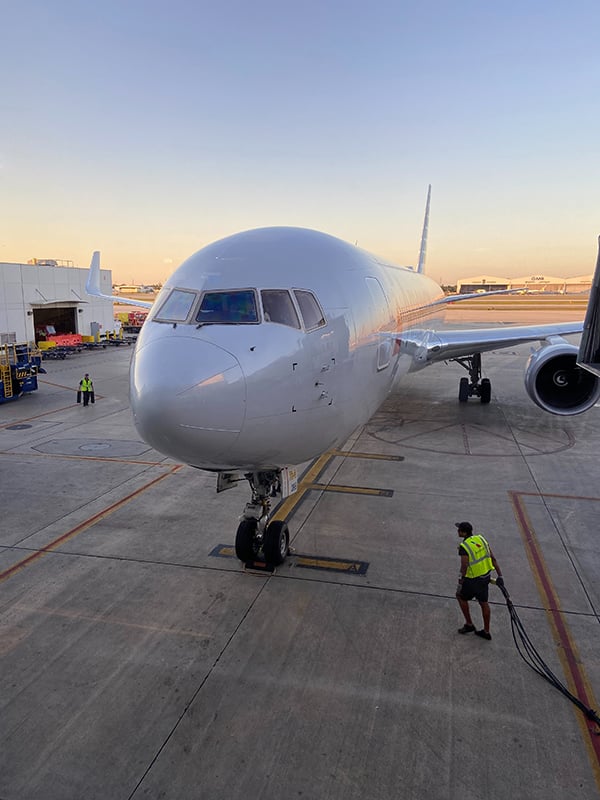Healthy for the Program, Healthy for the SMS Manager

Proactive aviation risk management is an organizational-wide effort towards identifying risk and mitigating hazards before an incident occurs.
For an aviation safety management system (SMS) to get to the point of proactive aviation safety, there will be considerable upfront work required. As you probably know from personal experience – aviation safety managers:
- Spend years implementing their aviation SMS
- Spend years overcoming resistance in management and among employees
- Creatively employ custom methods of monitoring safety performance
The list goes on, but frankly, aviation safety managers spend a long time dealing with a lot of "stuff." It can be as simple as daily frustrations and stress, to full-on burnout. The challenge is that safety managers have to manage their SMS in a way that improves safety, but without hating their job in the process.
Long story short, it’s tough, and aviation safety management systems are littered with safety as well as personal pitfalls.
Related Aviation Safety Manager Articles
- What Makes a Good Aviation Safety Manager?
- How to Tell If Aviation Safety Manager Is Doing Their Job
- How to Be a Better Aviation Safety Manager
1 – Don’t Lord Over Safety Information
This is perhaps one of the most common problems in any aviation SMS, and you are probably all too familiar with it – a dependency. Dependencies can take many forms, such as one safety manager:
- Doing things his/her way, under the table (i.e. not with prescribed risk management software or tools)
- Practicing secrecy with safety information, and being selective about who knows what
- Insisting on making every decision in regards to every single safety issue (i.e. picking apart instead of managing the issue)
In so many words, a dependency in an SMS is when one individual makes the functioning of the SMS dependent on his/her person rather than the procedures and/or abilities of the whole team. It slows down or eliminates the flow of safety information, with the potential to leave employees in the “dark” about critical safety information.
Moreover, because modern-day aviation SMS is more complex than traditional safety programs, dependencies are a heavy load for one person to carry. It’s a quick path to burnout. Proactive safety managers trust and rely on the abilities of fellow managers and employees to make qualified decisions, keeping information flowing and disseminating the safety manager’s workload.
2 – Don’t Rely Solely on Data for Performance Monitoring

I’ve spoken with many aviation safety managers about the various struggles they face, the foremost of which is burnout. And it’s almost always for the same reason: the feeling of having to endlessly monitor and improve the safety performance of an SMS.
One of the difficulties surrounding this topic is the notion of what the word “improvement” means for an SMS with no accidents. The tendency of all SMS implementations is that over time the traditional markers of performance monitoring, such as the numeric data of issues, incidents, etc, begin to level off. It appears as if:
- Improvement is happening much slower
- Improvement is not happening at all
- Though an organization may be safe it would also appear to be “stagnant.”
Thus the pressure to improve increasingly becomes greater as improving performance metrics becomes harder. At a certain point, the pressure turns into futility, anger, or apathy, all of which can rub off on SMS performance in detrimental ways. The root problem here is the reliance on traditional performance metrics, as well as not being aware of the fact that: Safety improvement will happen more asymptomatically as programs mature.
That is to say, at a certain point, safety needs to be measured with performance monitoring that is creative and cultivated specifically for an organization’s unique situation. Analyzing more nebulous but critical areas of an SMS, such as internal relationships or employee involvement, is a good place to start for customized monitoring. It keeps the job fresh, the exploration of the SMS robust, and the aviation risk management proactive.
Related Aviation SMS Performance Monitoring Articles
- Performance Based Aviation Safety Management Systems
- 4 Tips to Monitor Employee Safety Performance in Aviation SMS
- How to Measure Aviation Safety Performance in SMS Programs
3 – Don’t Assume Anything About Aviation Safety
An SMS can be extremely redundant. Many similar/same reported issues, paperwork, rote procedures, and bureaucracy are just some of the things that can make finding motivation in the aviation safety management field difficult. Accompanying rote behavior and lack of motivation are always assumptions.
- The assumption that same/similar issues arise for the same reasons
- The assumption that a new regulation is “just another” rule that isn’t pertinent
- The assumption that the same corrective preventative actions will have the same effect
Past successes aren’t future guarantees. The dynamic of an aviation SMS changes every day with different interactions between employees and management. More serious issues almost always arise from unexpected events that were compounded because of assumptions that made employees/management overlook early indicators. Great proactive risk managers work on their ability to look at each situation with fresh eyes.
Related Proactive Risk Management Articles
- Difference Between Reactive, Predictive and Proactive Risk Management in Aviation SMS
- Proactive Risk Management: What Root Causes Say About Management
- 7 Great Incentives for Proactive Risk Management
Final Thought: Assessing the Importance of Aviation SMS Managers
On a similar note to some of the above points, proactive safety managers should frequently be reevaluating their position in their SMS.
Proactive managers have a tendency to not assume a “static” role in their safety programs – static not in the sense of “not doing anything,” but in how they assess their priorities and immediate obligations to risk management.
As an SMS matures and becomes more complex, a safety manager’s role and importance will change. As new technologies become available, safety managers will have different means of managing and assessing risks.
Good managers keep in mind the fact that they are the central puzzle piece to their SMS and that their job is always changing.
Learn what other safety managers do during the day/week/month...
Last updated December 2025.






